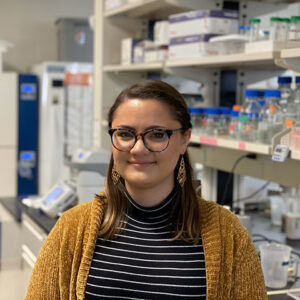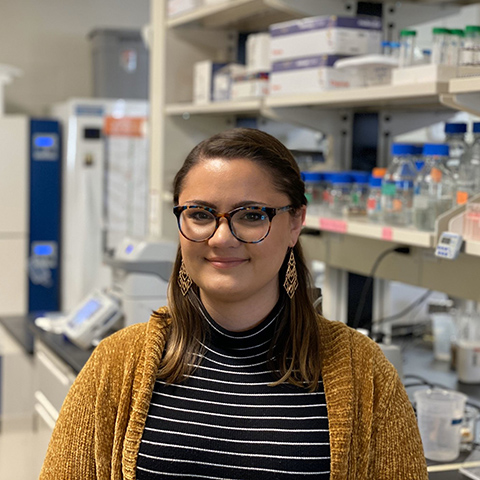We’re taking time to get to know the members of the GSA’s Early Career Scientist Committees. Join us to learn more about our early career scientist advocates.

Holly Kleinschmidt
Multimedia Subcommittee
Penn State University
Research interest
Gene expression is the process by which the genetic information encoded in DNA is translated into the arsenal of proteins required to orchestrate diverse biological processes in living systems. Careful regulation of gene expression is crucial to the health of an organism, as misregulation can have severe physiological consequences. The regulation of gene expression occurs at multiple levels, but one of the most important checkpoints is transcriptional initiation. The gatekeepers of transcriptional initiation are “transcription factors” (TFs): proteins that engage DNA in a sequence-specific manner to either promote or inhibit transcription of targeted genes.
A special class of eukaryotic TFs, called pioneer factors, are the first to bind during cellular differentiation and reprogramming, facilitating the binding of non-pioneer transcription factors and initiating gene cascades associated with the new cell type. However, the intricacies of how pioneer factors target their DNA motifs within the complex chromatin environment are largely unknown. Genome-wide studies have shown that pioneer factors bind only a small fraction of their putative motifs, and these binding events differ across cell types. The likelihood that a motif will be bound by its pioneer factor has been found to be influenced by local pioneer factor concentration, similarity to its consensus motif, cofactor availability, and competition and cooperation with other factors. Additionally, recent findings suggest that pioneer factor binding may be inhibited by features in heterochromatin, such as repressive histone post-translational modifications like trimethylation of the ninth lysine on the tail of histone protein H3 (H3K9me3). Though pioneer factor binding appears to be anti-correlated with the presence of H3K9me3, no studies have found a causative mechanism for the impediment of PF binding by H3K9me3 or other repressive features.
My thesis research in the Bai lab involves establishing a causative relationship between repressive features like H3K9me3 and pioneer factor binding inhibition. To do this, I am employing an in vivo technique called CRISPR interference (CRISPRi) to artificially “write” H3K9me3 marks to nucleosomes near strongly-bound pioneer factor binding sites throughout the genome. In this method, catalytically dead Cas9 is fused to a H3K9me3-writing protein domain, which is targeted to a pioneer factor binding site via guide RNA molecules specific to the region of interest. Chromatin immunoprecipitation (ChIP), followed by quantitative PCR, will be performed after CRISPRi to diagnose how pioneer factor binding changes after ectopically introducing H3K9me3 over its binding sites. This approach can be adapted to any pioneer factor, cell type, genomic locus, and repressive histone modification. These studies will help elucidate how pioneer factor binding is directly affected by repressive histone modifications, which will prove useful in diagnosing and treating diseases caused by promiscuous pioneer factor binding.
As a PhD-trained scientist, you have many career options. What interests you the most?
Like many of us, I discovered my love of science when I was very young. After returning home from grade school, I’d plop down with my afternoon snack in front of the TV to watch NOVA documentaries. I was fascinated by the experts I saw on the screen, and I envied the fact that they got to work on tackling scientific mysteries while I dissected owl pellets in biology class. I can’t remember the exact moment I decided I wanted to spend my life immersed in scientific discovery, but I attribute much of my scientific curiosity to those countless afternoons watching NOVA after school. Consequently, my middle-school self determined that it was my “destiny” to run my own research lab, just like those I saw on the screen.
As a woman in science, I’ve reflected a lot on what empowered me to pursue a scientific career, and I think it stems back to admiring the women featured in the NOVA documentaries and receiving excellent STEM mentorship throughout grade school. As somebody who wants to “do it all” (parent, teach, mentor, volunteer, and still have a work-life balance), I’ve been made privy to all of the reasons why academia isn’t fit for a woman with my aspirations. However, I am refusing to allow the seeds of doubt to germinate. If we want the system to change, we have to change the system! My first act in changing the system will be simply refusing to give up my dreams of running an academic research lab. I aim to work as a postdoctoral researcher for a handful of years after earning my PhD, and then I’ll debut the “Kleinschmidt” lab! I hope to work at a university that values and emphasizes teaching, so I can play a part in training and empowering the next generation of scientists. My dream is to mentor a diverse team of postdoctoral, graduate, undergraduate, and high school students who work together to tackle pivotal research questions in the field of gene regulation and precision medicine.
In addition to your research, how do you want to advance the scientific enterprise?
One of my passions has always been mentorship. As a first-grader, I served as a mentor to a kindergarten “buddy.” I loved the idea of sharing my (very little) expertise with a peer, to help show them the way as they ventured out on a new life journey. Since then, I’ve made an effort to engage in as many mentorship opportunities as possible. As a high schooler, I explored several types of mentorship through tutoring other students, participating in science outreach opportunities at the local science center and botanical garden, nannying children, volunteering with programs like the Special Olympics and Friends of Kids with Cancer, serving as “first snare” in my school’s drumline, helping with freshman orientation, and more! I continued my passion for mentoring as an undergraduate by working as a resident advisor for our Honors Learning Community, serving as a preparatory assistant for lab courses, and holding leadership positions in campus organizations.
I consider being a resident advisor as one of my pivotal life experiences. In that role, I discovered how crucial mentorship can be in predicting success after major life transitions. For example, retention of students who live on-campus in learning communities is much higher than students who live off-campus or do not live in learning communities. This phenomenon has been attributed to the unique mentorship and sense of community offered by learning communities. As a resident advisor in the Honors learning community, I served as a mentor in many capacities-helping my residents with homework, relationship problems, homesickness, financial concerns, mental health crises, career decisions, and so much more. Almost all of the academic departments and majors were represented in the Honors learning community, and I was struck by how much more anxious my STEM residents seemed to be compared to my other residents. My STEM residents operated on the assumption that their professors would not be understanding about mistakes, late assignments, missed classes, emergencies, or deaths in the family. I worry that the scientific community may forget about the humanity of those we work with. A scientist is not just a cog in the machine of research but a real person with needs, wants, desires, and fears.
My number one priority is to be an excellent mentor, and to be a good mentor is to recognize the humanity of our mentees. I believe that scientists are better mentors if they are vulnerable, own up to their own mistakes and misunderstandings, and admit their own imperfections. Fear of looking stupid, making a mistake, or disappointing others is a major barrier to scientific advancement. Many major scientific discoveries were made by accident! We must teach our mentees that it is okay to be imperfect, and we must embody that belief ourselves. I currently mentor two students in the lab, and I make an effort to tell them about the experiments that aren’t working, the silly accidents I make in the lab, the parts of research articles I don’t understand, and seminars that flew over my head. Additionally, I am contributing to developing a mentor/mentee training program for my graduate program, to improve advisor mentorship in our department. I hope to continue practicing my own mentorship skills during my PhD training and beyond.
As a leader within the Genetics Society of America, what do you hope to accomplish?
I became interested in the Genetics Society of America Early Career Leadership Program (GSA ECLP) after my first year of graduate school because I felt isolated from the scientific community, both as a consequence of being a first-generation scientist and being unable to travel to conferences due to the global pandemic. Being a part of the Penn State’s Center for Eukaryotic Gene Regulation, I am only exposed to only a small slice of genetics research on a daily basis. Additionally, our center only consists of a handful of very small labs, resulting in a limited pool of early career researchers with whom I can engage. I wanted to get to know more early career researchers from different universities, both to build my scientific network and to seek fellowship with other scientists at my level.
I chose to join the Multimedia Subcommittee because I enjoyed serving as my university’s Graduate Women in Science chapter’s public relations officer, which involved making flyers and social media content for our organization. In this role, I made content for upcoming events rather than scientific infographics, but I have always been interested in using my creativity for science communication. When I learned that the new ELCP Multimedia subcommittee was going to work on creating a podcast, I was hooked! Listening to podcasts is my #1 form of entertainment in the lab, though my podcasts-of-choice typically fall under true crime and comedy, not science. Coming into this role, I knew absolutely nothing about producing podcasts, so I saw this program as a great opportunity to not only network and socialize, but also to learn a completely new skill. Given how popular podcasts are becoming, I think having the ability to create this type of media is invaluable. I also saw this position as an opportunity to practice my verbal scientific communication skills, especially to a non-expert, scientific audience. I struggle to communicate my research with anybody who isn’t in my specific field of study. Producing the Genetics in Your World podcast has helped me become more comfortable talking about my science conversationally, and I am excited to practice this new skill when I finally get a chance to attend an in-person conference!
Previous leadership experience
- State College Graduate Women in Science (GWIS) Chapter
- President: May 2022–Present
- Vice-President: May 2021–May 2022
- Public Relations Officer: May 2020–May 2021
- Eukaryotic Gene Regulation Predoctoral Training Program: June 2021–Present
- BMMB Graduate Program Steering Committee Member: May 2020–Present
- Biochemistry, Microbiology, & Molecular Biology Graduate Student Association (BMMB GSA)
- President: May 2020–May 2021
- First-Year Representative: October 2019–May 2020
- Science Achievement Graduate Fellows Program: August 2019–Present
Contact information































